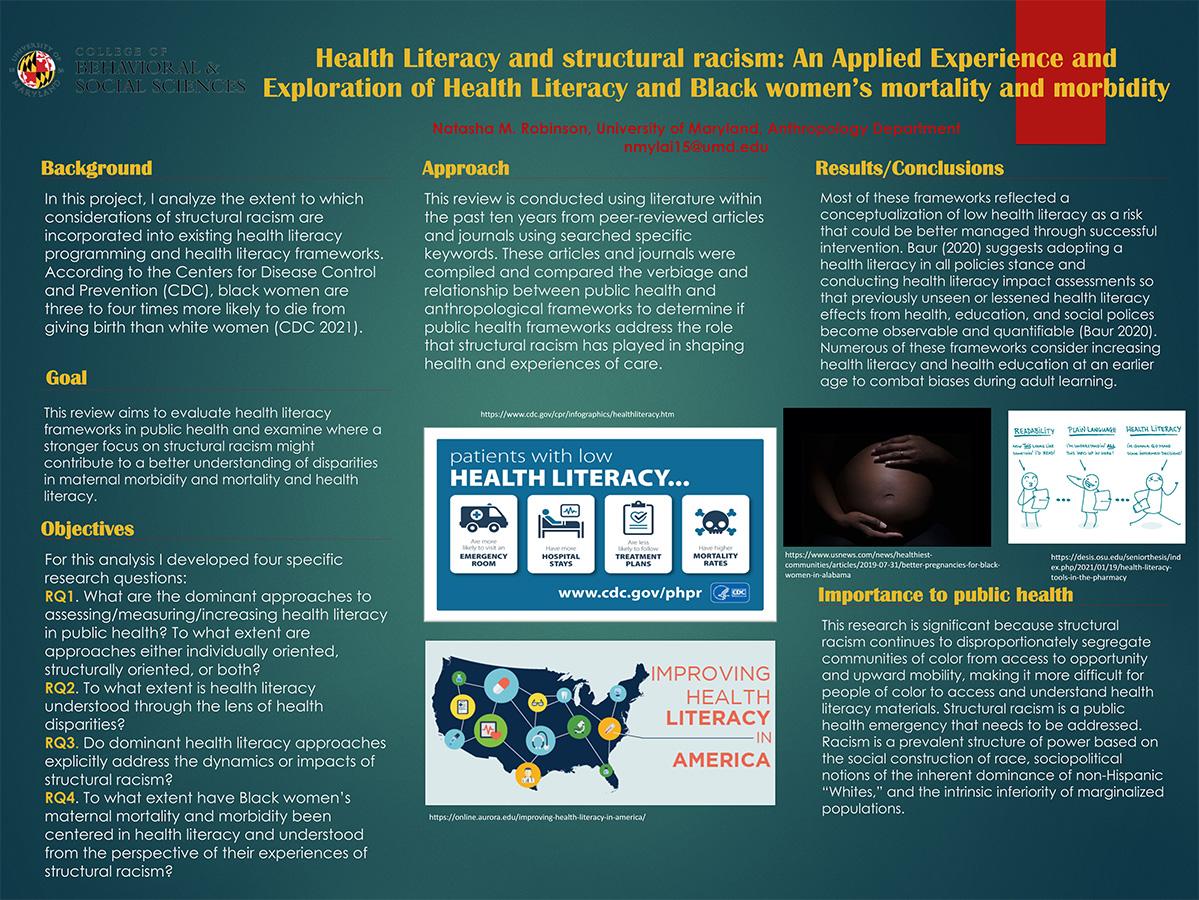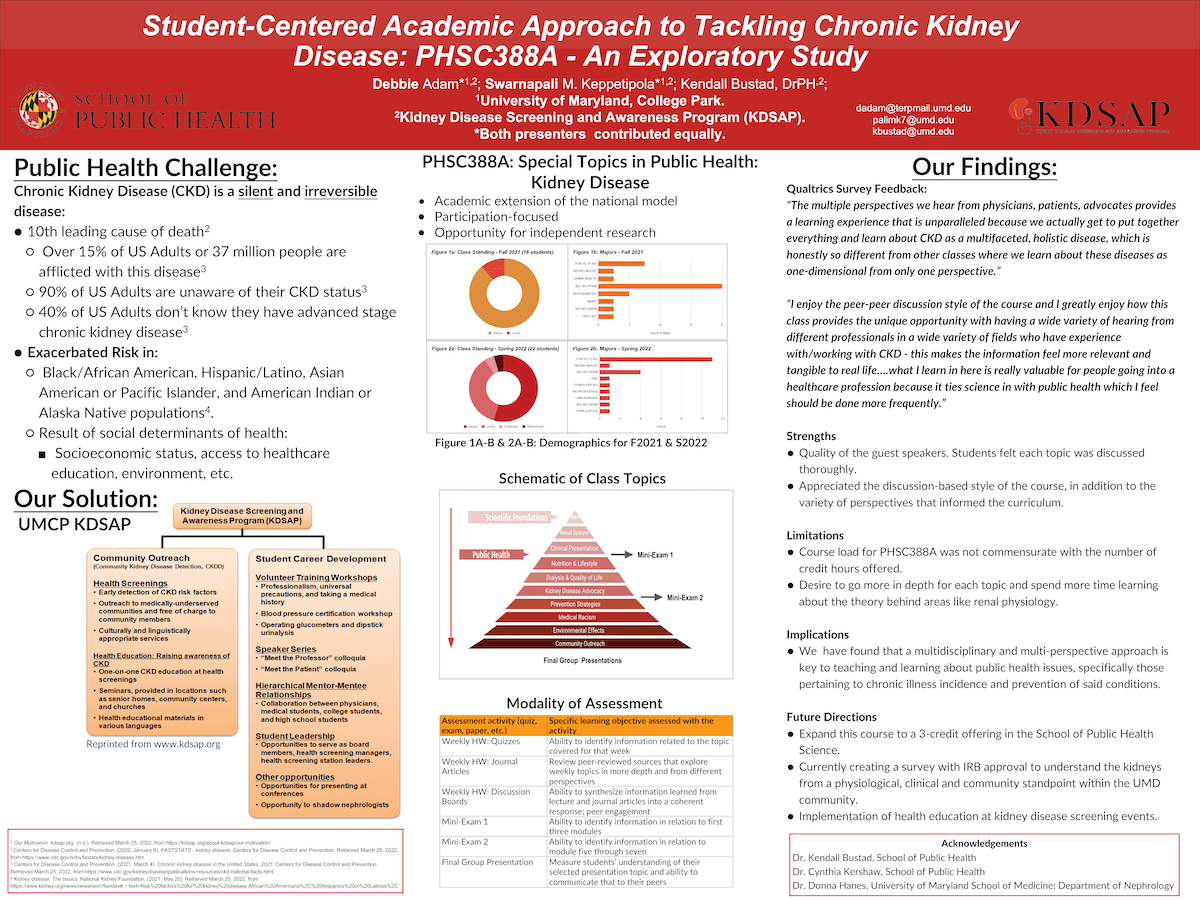
Poster #34
Title: Health Literacy and Structural Racism: An Applied Experience and Exploration of Health Literacy and Black women's mortality and morbidity
Presenting Author: Natasha Robinson
Authors:
Faculty Mentors: Andrea M. López, Alice M. Horowitz, Matthew Thomann
Primary Category: Health Literacy, Health Communication, Health Education
Secondary Category: Healthy Equity, Racism and Social Injustice, Population Health, Immigration and Health
Background: In this project, I analyze the extent to which considerations of structural racism are incorporated into existing health literacy programming and health literacy frameworks. According to the Centers for Disease Control and Prevention (CDC), black women are three to four times more likely to die from giving birth than white women (CDC 2021)
Goal: This review aims to evaluate health literacy frameworks in public health and examine where a stronger focus on structural racism might contribute to a better understanding of disparities in maternal morbidity and mortality and health literacy.
Objectives: For this analysis, I developed four specific research questions: RQ1. What are the dominant approaches to assessing/measuring/increasing health literacy in public health? To what extent are approaches either individually oriented, structurally oriented, or both? RQ2. To what extent is health literacy understood through the lens of health disparities? RQ3. Do dominant health literacy approaches explicitly address the dynamics or impacts of structural racism? RQ4. To what extent have Black women’s maternal mortality and morbidity been centered in health literacy and understood from the perspective of their experiences of structural racism?
Approach/Methods: This review is conducted using literature within the past ten years from peer-reviewed articles and journals using searched specific keywords. These articles and journals were compiled and compared the verbiage and relationship between public health and anthropological frameworks to determine if public health frameworks address the role that structural racism has played in shaping health and experiences of care.
Results: Most of these frameworks reflected a conceptualization of low health literacy as a risk that could be better managed through successful intervention. Baur (2020) suggests adopting a health literacy in all policies stance and conducting health literacy impact assessments so that previously unseen or lessened health literacy effects from health, education, and social policies become observable and quantifiable (Baur 2020). Numerous of these frameworks consider increasing health literacy and health education at an earlier age to combat biases during adult learning.
Importance to Public Health: This research is significant because structural racism continues to disproportionately segregate communities of color from access to opportunity and upward mobility, making it more difficult for people of color to access and understand health literacy materials. Structural racism is a public health emergency that needs to be addressed. Racism is a prevalent structure of power based on the social construction of race, sociopolitical notions of the inherent dominance of non-Hispanic “Whites,” and the intrinsic inferiority of marginalized populations.

Poster #35
Title: Student-Centered Academic Approach to Tackling Chronic Kidney Disease: PHSC388A - An Exploratory Study
Presenting Author: Swarnapali Keppetipola, undergraduate student, Public Health Science
Authors: Debbie Adam, (University of Maryland College Park, School of Public Health: Public Health Science, undergraduate student) *both presenting author and author 2 contributed equally to the presentation with the same faculty mentor; Kendall Bustad, DrPH (University of Maryland College Park, School of Public Health: Public Health Science, faculty)
Faculty Mentors: Dr. Kendall Bustad
Primary Category: Health Literacy, Health Communication, Health Education
Secondary Category: Innovative Solutions to Public Health Challenges
Background: Chronic Kidney Disease (CKD) is a silent and irreversible disease that is the 10th leading cause of death in the United States – over 15% of US Adults are impacted by this disease and 90% of US Adults are unaware of their CKD status. There exists an exacerbated risk of CKD in Black/African American, Hispanic/Latino, Asian American or Pacific Islander, and American Indian or Alaska Native populations due to several social determinants of health such as socioeconomic status, access to healthcare education, environment, etc.
Goal: The purpose of our project is to address the concerning incidence of CKD, and come up with a solution to increase awareness and health literacy amongst student populations about this public health crisis.
Objectives: The specific tasks that were undertaken in this process were two-fold:
- The foundation of a chapter of the Kidney Disease Screening and Awareness Program at the University of Maryland with core tenets focused on community outreach and student career development.
- The creation of a 1-credit Student Initiated Course (STIC) that aims to educate students from any major about the importance of chronic kidney disease, its relationship to public health, and forms of prevention.
Approach/Methods: We piloted a student initiated course in Fall 2021 and Spring 2022 focused on exploring CKD from a scientific and public health standpoint. The following topics were discussed through group activities and guest speaker presentations: Introduction to the excretory/renal system; CKD from a clinical perspective; Impact of disease on quality of life, nutrition, and lifestyle; advocacy; environmental impacts; preventive care; influences of implicit bias; and community outreach. Students ultimately demonstrated their level of learning through final group presentations on a course topic of their choosing.
Results: Students appreciated the use of guest speakers and valued viewing CKD from a multi-perspective lens. As a result of the class, some students entered internships related to course topics post-class completion and engaged in independent research.
Importance to Public Health: We found that a multidisciplinary and multi-perspective approach is key to teaching and learning about pervasive health issues, specifically those pertaining to chronic illness incidence and prevention of said conditions.
